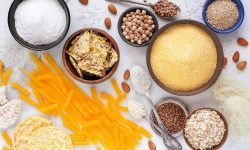Favourite Gluten-Free Items Available at Spud May National Celiac Awareness Month, but every day Spud…
Did you know that close to half of all food produced worldwide is wasted? Yep, whether it’s discarded in processing, transport, supermarkets or kitchens, this unbelievable statistic is quite real, even while we face a global food insecurity crisis.
Canadians are on average throwing away approximately $600 per year in wasted food.
In the average Canadian household, one in four produce items gets thrown out, which equates to throwing approximately $600 per year into the trash. Regardless of the potential of how many people we could feed if everyone donated one quarter of their produce, or donated $600 a year, the point is that there is needless waste at many different points of a produce item’s journey. We need to educate ourselves on what we can do to ensure that from the first level of processing, produce items don’t stop until they get onto someone’s plate.
At Spud, we take food waste seriously, and realize that there is always a scrappy option for a potentially wasted piece of food. Here’s how we stay zero waste.
At Spud, we don’t have displays:
Have you ever wondered how grocery stores always appear so fully stocked with perfect looking produce every time you go in? Well, this practice results in a lot of imperfect looking produce, or produce that is close to ripeness, being chucked without a second chance. Not having displays means that we don’t need consider having fully stocked shelves simply because it looks nice, and allows us to limit purchasing directly to our output. We turn over 80% of our inventory in 48 hours, and all inventory in less than 12.5 days. There is not enough time for products to go past their best before date. In contrast to Spud, retail grocery stores turn over inventory in 27 days.
We find homes for our ripe and imperfect produce and groceries:
Fruit and veggies with funny looking extremities have the same taste and same amount of nutrients as their symmetrical counterparts. Unfortunately, far too many of these products are discarded by the farmer, or the supermarket, based on a cultural expectation to see perfect looking produce every time.
When we receive imperfect fruit, or see that it is getting close becoming over ripe, we do one of the following: send it over to be juiced at The Juice Box, label it “overripe” and sell it at a discounted rate, or donate it to a local organization that can use it straight away. If a can of soup gets dropped and dented on it’s way to us, we’ll donate the can to an organization that deals with hunger relief. This food is all still perfectly good to eat, and we’re well connected to the resources that can make use of anything that we can’t.
Here’s what you can do to ensure you’re not wasting produce at home:
It’s important to remember that fruits and veggies are still breathing even once they’ve been picked – refrigerated items last for a longer time because the cold slows down respiration. With that in mind, here are some useful tips for preserving your produce for a longer time:
- Don’t suffocate your veggies! Take produce out of the plastic bags they’re in. The airtight wrappings speed up the decay process.
- Don’t wash produce until it’s about to be prepared. The moisture can result in mold growth.
- When living cells are broken, micro-organisms begin to grow. So don’t rip off your fruit’s stems!
- Make sure you’re prioritizing produce that goes bad quickly.
- Bananas and avocados that are ripe can placed in a bag and be refrigerated to be kept, but only for a couple of days.
When it comes to food waste, everybody needs to chip in.
Environmentally focused businesses like Spud and various international campaigns are working to fill the voids that exist when it comes to food waste awareness, but it is also so important to bring mindfulness into our own homes, and create new habits that prioritize the importance of being resourceful.
These small, habitual changes, that redesign social norms, and allow energy to be redistributed through sustainable methods, are what propel us as a society to create great and lasting change. The trade-off is great; saving food means saving money, reducing emissions, and feeding more people. So let’s get scrappy about saving our produce!
| CHECK OUT OUR AISLES |




